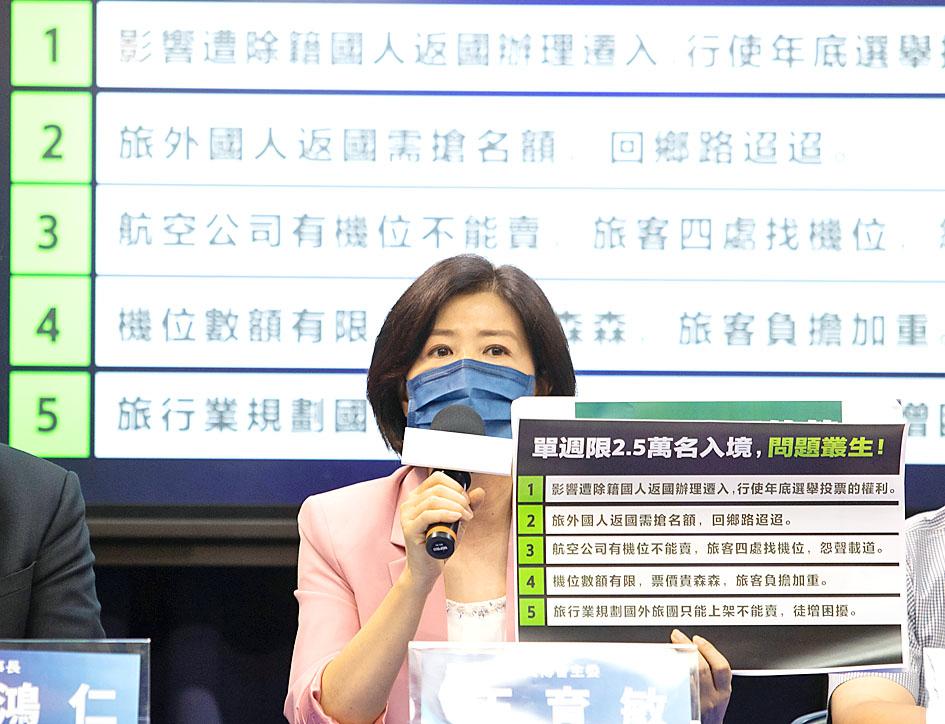The government should allow more Taiwanese to return home by raising the cap and excluding citizens from the weekly cap on inbound travelers, the Chinese Nationalist Party (KMT) told reporters yesterday.
The Central Epidemic Command Center (CECC) has eased the quarantine requirement for inbound travelers to three days of home quarantine and four days of self-initiated disease prevention, and capped the number of inbound travelers at 25,000 per week.
KMT Culture and Communications Committee director-general Alicia Wang (王育敏) said that the COVID-19 pandemic has prevented many Taiwanese studying overseas from returning home, but they must update their domicile registration by July 26 if they want to vote in the nine-in-one local elections.

Photo: CNA
“However, the weekly cap on inbound travelers has caused Taiwanese expatriates to have to fight for the few remaining seats available on Taiwan-bound flights,” Wang said. “Even if they succeed in making reservations, either the ticket price has skyrocketed or they can only reserve seats in business class.”
Taiwan Travel Agent Association chairman Huang Wen-ching (黃文卿) said that the chaos caused by the weekly cap serves as another example of how the government fails to communicate with travel agents before a policy change or gives them “very little time to adapt” to changes.
“Taiwanese would have an easier time returning to the country if the weekly cap was imposed on visitors and business travelers from other countries, not citizens,” Huang said, adding that this would still help contain a potential COVID-19 outbreak.
The number of inbound travelers had reached about 4,500 on Wednesday last week, when the new policy took effect, Taipei Association of Travel Agents board member Lan I-ching (藍一晴) said.
As more people are expected to travel overseas this summer, the government will have a challenge handling the influx of travelers if it does not increase the cap, he said.
“People who need to go abroad cannot be certain when they will return, because they might be forced to fly on another date if the weekly cap has been reached,” Lan said.
“Travel agents can allow people to sign up for the tours they offer, but they cannot tell tourists for certain when they can depart because the government has yet to lift the ban on travel agents arranging tours,” Lan said. “Once tour groups are once again allowed to travel overseas, we would not be able to meet the rising demand with the weekly cap still in place.”
The CECC still requires travelers to present a negative polymerase chain reaction test result taken within 48 hours of boarding a flight to Taiwan, but 10 countries have dropped their own similar requirements, Lan said.
The weekly cap would discourage foreign airlines from offering flights to Taiwan, Taipei Association of Travel Agents board member Wong Hong-ren (翁鴻仁) said.
Of the 25,000 people entering Taiwan per week, 20,000 would arrive on China Airlines and EVA Airways flights, Wong said, adding that the remaining passengers would arrive on foreign carriers.
With so few passengers entering Taiwan each week, foreign airlines might suspend flights to the nation, Wong added.

Eight restaurants in Taiwan yesterday secured a one-star rating from the Michelin Guide Taiwan for the first time, while three one-star restaurants from last year’s edition were promoted to two stars. Forty-three restaurants were awarded one star this year, including 34 in Taipei, five in Taichung and four in Kaohsiung. Hosu (好嶼), Chuan Ya (川雅), Sushi Kajin (鮨嘉仁), aMaze (心宴), La Vie by Thomas Buhner, Yuan Yi (元一) and Frassi in Taipei and Front House (方蒔) in Kaohsiung received a one-star rating for the first time. Hosu is known for innovative Taiwanese dishes, while Chuan Ya serves Sichuan cuisine and aMaze specializes

Taitung County is to launch charter flights to Malaysia at the end of this year, after setting up flights to Vietnam and Thailand, the Taitung County Government said yesterday. The new charter flight services, provided by low-cost carrier Batik Air Malaysia, would be part of five-day tour packages for visits to Taitung County or Malaysia. The Batik Air charter flight, with about 200 seats, would take Malaysian tourists to Taitung on Dec. 30 and then at 12:35pm return to Kuala Lumpur with Taiwanese tourists. Another charter flight would bring the Taiwanese home on Jan. 3 next year, arriving at 5:30pm, before taking the

Taiwan High Speed Rail Corp. (THSRC) plans to ease strained capacity during peak hours by introducing new fare rules restricting passengers traveling without reserved seats in 2026, company Chairman Shih Che (史哲) said Wednesday. THSRC needs to tackle its capacity issue because there have been several occasions where passengers holding tickets with reserved seats did not make it onto their train in stations packed with individuals traveling without a reserved seat, Shih told reporters in a joint interview in Taipei. Non-reserved seats allow travelers maximum flexibility, but it has led to issues relating to quality of service and safety concerns, especially during

An exhibition celebrating Taiwan and Japan’s comic culture opened on Saturday in Taichung, featuring a section that explores Taiwanese reproductions of Japanese comics from when martial law limited Japanese representation. “A Century of Manga Culture: An Encounter of Taiwan and Japan’s Youth” held its Taiwan opening ceremony at Taichung’s National Taiwan Museum of Comics after an initial one-month run in Japan’s Kyoto International Manga Museum between May 24 and June 24. Much like the Kyoto exhibition, the show mainly celebrates the comic connection between Taiwan and Japan through late Taiwanese comic book